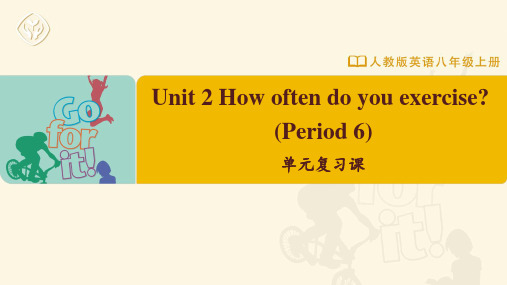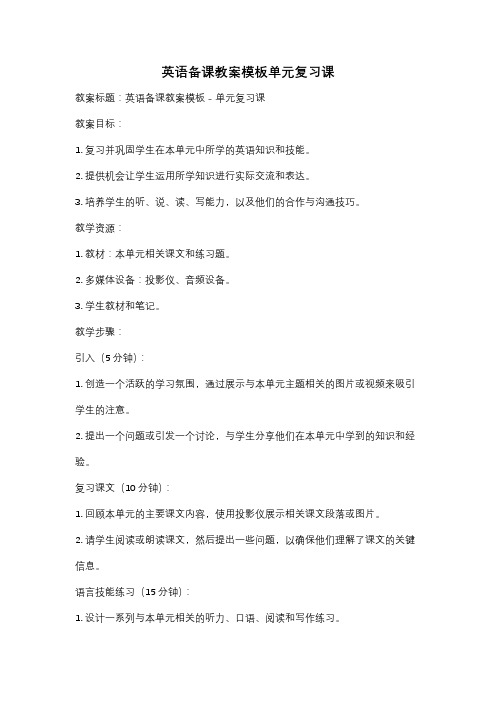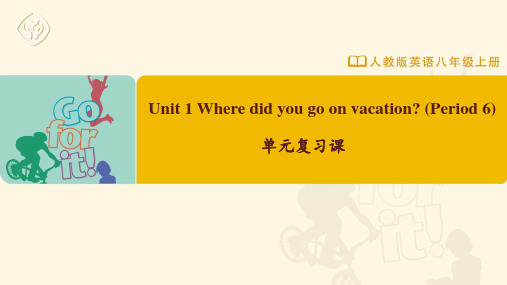人教版英语单元复习课模板
人教版新目标初三英语1-10单元复习教案

(总第课时)Review of units 6~10第1课时教学目标知识技能1. Listening practice using the target language.2. Oral practice using the target language.过程方法1.According to listening to t rain students’ listening skill.2.According to oral practice to t rain students’ speaking skill.情感态度教学重点1. Listening practice using the target language.2. Oral practice using the target language.教学难点Train students’ listening skill and speaking skill.教学方法Train listening and speaking教学课时教学过程Step1 Revision1. Dictate some vocabulary words in units 6~10.2. Choose four or five words. Encourage students to make sentences with them.Step 2 Presentation.Ⅰ.1a1.Check that they understand what they need to do by having one or two students complete other answers.2.Ask the students to do the crossword individually or in pairs.3.Check the answers.Ⅱ1b1.Explain to students that they need to write clues like the clues for the crossword in activity 1a.2.Ask the students to work in pairs.Step 3 Listening2a1.Ask the students to pay attention to the four pictures.2.Play the recording ,students listen and match the conversations with the correct pictures by writing the numbers in the boxes.3.Check the answers.Ⅳ.2b1.Set a time limit of two minutes. Students go through the lists of questions.2.Ask the students to listen to the same recording again, complete the four different questions next to the pictures in Activity 2a.3.Let students check their answers in pairs, and then with the whole class.Step 4 Pairwork1.Read the instructions to the class.Point out the sample conversation in the box. Invite a pair of students to read it to the class.2.Ask the students to work with a partner and use the information in activity 2b.3.Ask several pairs of students to say their conversations to the class.Step 5 SummaryWrite some vocabulary on their exercise book ,and make sentences with some of them. Read the clues and complete the crossword.Choose words from units 6-10 and write a clue for each word . Read the clues to your partner. He or she guesses the words.Listen and match the conversations with the correct pictures by writing the numbers in the boxes.Step 6 HomeworkListen again Complete the four different questions next to the pictures in Activity 2a. Role play ,practice the conversations in activity 2b with their partner.板书设计Review of units 6~10The First PeriodTarget Language:A: I’d like to be a volunteer. Can you help me?B: Sure. What kind of volunteer work would you like to do?A: Well, I like working with kids.教学反思(总第课时)Review of units 6~10第2课时教学目标知识技能1.Oral practice talking about places you would like to visit.2.Oral particle narrating past events.3.Oral practice talking about the history of inventions.过程方法1.Train students’ speaking skill.2.Train students’ writing skill.情感态度Thank all the inventors. It is they who make our life convenient.教学重点1. Talk about places you would like to visit.2. Narrate past events.3. Talk about the history of inventions.教学难点Train students’ speaking and writing skills.教学方法Train speaking and writing教学课时 1课时教学过程Step 1。
人教版六年级上册英语期末复习复习教案(1——4单元)

人教版六年级上册英语期末复习复习教案(1——4单元)一、教学目标:1. 复所学的第一至第四单元的单词、短语及句型;2. 能听懂、会说、会读、会写本单元的相关词汇、短语和句型;3. 培养学生研究英语的兴趣,增强学生的英语交流能力和应变能力。
二、教学重点:1. 复第一至第四单元的单词、短语及句型;2. 研究本单元的相关词汇、短语和句型。
三、教学内容:本节课主要内容包括:复第一至第四单元的单词、短语及句型,以及研究本单元的相关词汇、短语和句型。
第一单元:1. 单词:- My name is...- How are you?- Fine, thank you.- Friend2. 短语:- Hello, my name is... - Goodbye, see you. - Good morning.3. 句型:- What's your name? - Nice to meet you. - How old are you?第二单元:1. 单词:- Classroom- Desk- Chair- Book- Bag2. 短语:- Open your book.- Sit down, please.- Stand up, please.3. 句型:- What's in your classroom?- Go to your classroom. 第三单元:1. 单词:- Family- Grandmother- Grandfather- Father- Mother- Brother- Sister2. 短语:- This is my family.- Who's this?3. 句型:- How many people in your family? - What's your father's name?第四单元:1. 单词:- Animal- Tiger- Elephant- Giraffe- Monkey- Panda2. 短语:- What's this in English?- It's a...3. 句型:- What's your favourite animal?- What can it do?四、教学方法:采用听说读写的教学方法,以小组合作研究为主,注重口语交际能力的训练。
人教版初一英语复习课教案——Units1—8总复习

人教版初一英语复习课教案——Units1—8总复习As the school year comes to a close, it's time to review all the language skills we've learned in Units 1-8 of our People's Education Press English textbook. This review will help ensure that we have a complete understanding of the language, grammar, and vocabulary we've covered over the past several months. As we prepare to move ahead, it's important to look back so that we do not miss any important information or skills.Unit 1In Unit 1, we learned the basics of introductions, including greetings, names, ages, and nationalities. We also learned how to ask and answer simple questions about ourselves and others. To review this unit, practice introducing yourself to someone else in the class, or ask someone else their name, age, and nationality. You can also review the vocabulary and practice asking and answering simple questions.Unit 2In Unit 2, we expanded our knowledge of personal information to include family, jobs, and hobbies. We learned how to describe people and things using adjectives, and we practiced talking about our likes and dislikes. To reviewthis unit, write a short paragraph about yourself, include information about your family, job or school, and hobbies. Use adjectives to describe your physical appearance and personality.Unit 3In Unit 3, we learned how to talk about our daily routines, including getting up, having breakfast, and going to school or work. We also learned how to tell time and use prepositions to describe locations. To review this unit,write a daily schedule for yourself or a family member, including what time you wake up, go to bed, and what you do during the day. Use prepositions to describe where you go during the day.Unit 4In Unit 4, we expanded our vocabulary to include foods, restaurants, and ordering at restaurants. We also learned howto give directions and use imperatives to give commands. To review this unit, practice giving directions to a location on a map. Also, practice ordering a meal at a restaurant, including drinks, appetizers, main courses, and desserts.Unit 5In Unit 5, we learned how to talk about our likes and dislikes in terms of sports and leisure activities. We also learned how to ask and answer questions about the weather and use comparative adjectives. To review this unit, practice talking about a sport or leisure activity you enjoy. Also, practice asking and answering questions about the weather and using comparative adjectives to describe different things.Unit 6In Unit 6, we expanded our vocabulary and grammar knowledge to include jobs, places of employment, and future plans. We also learned how to use the simple future tense and modals to talk about possibility and necessity. To reviewthis unit, practice talking about your future plans,including what job you would like to have and where you seeyourself living in the future. Use modals to talk about possibility and necessity.Unit 7In Unit 7, we learned how to describe places and transportation options. We also learned how to use the present continuous tense to talk about actions happening now and schedule events in the future. To review this unit, describe your hometown or a place you have visited. Include information about the buildings, people, and transportation options. Use the present continuous tense to talk about actions happening now and future events.Unit 8In Unit 8, we learned about people and events in history, including famous people and significant events. We also learned how to ask and answer questions using the past tense. To review this unit, research and describe a famous person from history or a significant event. Use the past tense to talk about the person or event.Overall, these reviews of each unit from our People's Education Press English textbook will help us to ensure that we have a comprehensive understanding of the language, grammar, and vocabulary that we've learned this school year. Practicing the above activities regularly will help us become more fluent and confident in our language abilities, which will be helpful as we continue to learn and grow in our English education.。
七年级-人教版-英语-上册-Unit-2-单元复习课

知识 复现
属关系) 时,一般用of 短语来表达。可翻译为“…… 的……”。A of B 所有格结构需翻译成“B的A”。 (2)表示有生命的人或事物的所属关系时,一般用“’s”所 有格。单数名词后直接加“’s”,复数名词后加“s’ ”。
考点突破
5.here 置于句首的倒装句
① 这里有两张我的全家福。 _H__er_e__ _a_r_e___ two photos __o_f__ __m__y__ __fa_m__il_y__.
它们)
它们)
语法突破
2.人称代词
知识 复现
(2)人称代词主格 在句中作主语或表语,代替上文提到的人或物,常用于句首。
(3)人称代词宾格 ‣ 在句子中通常用在动词和介词后,充当宾语。 ‣ 可以放在be (am, is, are) 动词后作表语。 如:This is me. 这就是我。
(3)当询问不确定身份的人时,要用代词“it”。
考点突破
3.Have a good day!
① —Have a good day, Lucy! —______.
A.Me, too B.You, too
C.Bye
D.Fine
② —Well, have a good day! —______
A.Bye!
考点突破
4.of 表示所属关系
① Look at this photo ______ John’s family.
A.in
B.on
C.with
D.of
② 这是一张中国地图。That is ___a__ __m__a_p_ __o_f__ _C_h_i_n_a__.
③ 我的一张家庭照 __a___ _p_h_o_t_o__ _o_f___ __m__y__ _f_a_m_i_ly__
八年级-人教版-英语-上册-Unit 2 单元复习课

④ 你看起来不太健康,应该吃得健康些。 You look _u_n_h_e_a_l_th_y_, and you should eat _h_e_a_lt_h_i_ly__.
② 放松的最好方式是通过锻炼。 The best way to relax is __th_r_o_u_g_h_ exercise.
③ We learn to speak through __sp_e_a_k_i_n_g_(speak).
考点突破
6.through ④ 这条河穿过森林。 The river runs _th_r_o_u_g_h__ the forest. ⑤ 女孩跑过马路。 The girl runs __a_c_ro_s_s__ the road. ⑥ 那匹马跳过了墙。 The horse jumped ___o_v_e_r__ the wall. ⑦ 我们的公共汽车经过这所小学。 Our bus runs ___p_a_st___ this primary school.
(2)在英语的表达习惯中,当表示“虽然……,但是……” 时,although/though 和but 不可用于同一个句子之中。类似 的还有 because 和 so。
考点突破
6.through
① 直着穿过那道上方有“安全出口”字样的门。 Go straight _t_h_ro_u_g_h__ that door under the EXIT sign.
猛烈地”;用作形容词,意为“硬的;困难的”
考点突破
英语备课教案模板单元复习课

英语备课教案模板单元复习课教案标题:英语备课教案模板 - 单元复习课教案目标:1. 复习并巩固学生在本单元中所学的英语知识和技能。
2. 提供机会让学生运用所学知识进行实际交流和表达。
3. 培养学生的听、说、读、写能力,以及他们的合作与沟通技巧。
教学资源:1. 教材:本单元相关课文和练习题。
2. 多媒体设备:投影仪、音频设备。
3. 学生教材和笔记。
教学步骤:引入(5分钟):1. 创造一个活跃的学习氛围,通过展示与本单元主题相关的图片或视频来吸引学生的注意。
2. 提出一个问题或引发一个讨论,与学生分享他们在本单元中学到的知识和经验。
复习课文(10分钟):1. 回顾本单元的主要课文内容,使用投影仪展示相关课文段落或图片。
2. 请学生阅读或朗读课文,然后提出一些问题,以确保他们理解了课文的关键信息。
语言技能练习(15分钟):1. 设计一系列与本单元相关的听力、口语、阅读和写作练习。
2. 听力练习:播放与本单元相关的录音,要求学生回答相关问题或填写相关信息。
3. 口语练习:分组让学生进行对话练习,鼓励他们运用本单元所学的语言表达自己的观点和意见。
4. 阅读练习:提供一篇与本单元主题相关的短文,要求学生阅读并回答相关问题。
5. 写作练习:让学生根据所学知识和经验,撰写一篇与本单元主题相关的短文或写一封信。
小组活动(15分钟):1. 将学生分成小组,每个小组选择一个本单元的课文或话题进行讨论和展示。
2. 每个小组派出一名代表,向全班展示他们的讨论成果,并回答其他同学的问题。
总结与评估(5分钟):1. 总结本节课的重点内容,强调学生在本单元中所学到的重要知识和技能。
2. 对学生进行简单的评估,例如口头提问或书面测试,以检查他们对本单元知识的掌握程度。
作业布置(5分钟):1. 布置适当的作业,例如完成本单元的练习题、准备下节课的课前预习等。
2. 鼓励学生自主学习和探索,提供相关学习资源和建议。
教学延伸:1. 鼓励学生积极参与课堂活动,并提供个别指导和反馈。
六下人教版英语u2复习课教案

六下人教版英语u2复习课教案教案标题:六下人教版英语U2复习课教案教案目标:1. 复习学生在本单元所学习的词汇和句型。
2. 提高学生的听、说、读、写能力。
3. 培养学生的合作学习和自主学习能力。
教学重点:1. 复习并巩固本单元所学的词汇和句型。
2. 提高学生的口语表达能力。
教学难点:1. 学生对本单元所学内容的整体掌握程度。
2. 学生在实际交流中的语言运用能力。
教学准备:1. 多媒体设备。
2. 课本、练习册、单词卡片等教学资源。
教学过程:Step 1: 复习导入(5分钟)1. 利用图片或单词卡片复习本单元所学的动物名称。
2. 通过问答的方式复习本单元的句型,如"What can you see?" "I can see a/an..."等。
Step 2: 词汇复习(10分钟)1. 利用多媒体设备播放本单元的词汇练习,让学生听音并说出对应的单词。
2. 给学生分发词汇卡片,让他们根据卡片上的图片和单词进行配对练习。
Step 3: 句型复习(15分钟)1. 利用多媒体设备播放本单元的句型练习,让学生跟读并模仿。
2. 将学生分成小组,让他们进行对话练习,使用本单元所学的句型进行交流。
Step 4: 听力训练(15分钟)1. 播放与本单元相关的听力材料,让学生听并回答问题。
2. 将学生分成小组,进行听力对话练习,提高他们的听力理解能力。
Step 5: 口语表达(15分钟)1. 给学生一些关于动物的问题,让他们进行小组讨论,并展示出他们的口语表达能力。
2. 鼓励学生使用本单元所学的句型和词汇进行口语表达。
Step 6: 作业布置(5分钟)1. 布置相关的课后作业,如完成练习册上的习题或写一篇关于自己喜欢的动物的短文。
2. 提醒学生预习下一课时的内容。
教学反思:本节复习课通过多种形式的活动,巩固了学生在本单元所学的词汇和句型。
通过小组讨论和口语表达的练习,学生的口语表达能力得到了提高。
人教版初一英语复习课教案——Units1—8单元重点归纳

人教版初一英语复习课教案——Units1—8单元重点归纳Dear all,As we are approaching the end of the semester, it is crucial for us to review and consolidate what we have learned in the past eight units. Therefore, today's lesson aims to summarize the key points of Units 1-8 in our textbook.Unit 1: GreetingsIn this unit, we learned how to greet and respond to people in different situations. We also learned how to introduce ourselves and ask for personal information. Some key phrases and sentence structures include:- Hello/Hi/Good morning/Good afternoon/Good evening.- Nice to meet you/pleased to meet you.- What's your name?/My name is...- How are you?/I'm fine/thank you.- Where are you from?/I'm from...Unit 2: School lifeIn this unit, we learned a lot about school life, such as classes, subjects, and school facilities. Some useful phrases and sentence structures include:- What's your favorite subject?/My favorite subject is...- I have classes from...to...- We have PE/music/art/English/Maths/Science.We also learned how to ask for and give directions to certain places in school, such as the library, the canteen, and the gym.Unit 3: Hobbies and activitiesIn this unit, we learned how to describe our hobbies and activities. Some useful phrases and sentence structures include:- What do you like doing in your free time?/I like...- I enjoy playing football/reading books/going swimming.- How often do you...?/I...every day/week/month.We also learned how to make invitations and accept or decline them politely.Unit 4: Family and friendsIn this unit, we learned how to describe our family members and friends, as well as their occupations and personalities. Some useful phrases and sentence structures include:- Who's in your family?/I havea...mother/father/brother/sister.- What does your father/mother do?/He/She is a...- My friend is...funny/smart/kind/helpful.We also learned how to express our feelings and emotions towards others.Unit 5: Food and drinksIn this unit, we learned how to order food and drinks in a restaurant or a caf茅. Some useful phrases and sentence structures include:- I'm hungry/thirsty. What should I eat/drink?- Could I have a...burger/salad/sandwich?- How much does it cost?/It's...dollars/pounds/yuan.We also learned how to describe food and give opinions on it.Unit 6: Clothes and colorsIn this unit, we learned how to describe different types of clothes and their colors. Some useful phrases and sentence structures include:- What are you wearing today?/I'm wearinga...shirt/pants/dress.- What color is it?/It's...red/blue/yellow.- I like wearing...casual clothes/sportswear.We also learned how to go shopping for clothes and bargain with the seller.Unit 7: Weather and seasonsIn this unit, we learned how to describe different types of weather and seasons. Some useful phrases and sentence structures include:- What's the weather like today?/It's...sunny/windy/rainy.- Which is your favorite season?/My favorite season is...spring/summer/autumn/winter.- I like...skiing/ice-skating/swimming in winter/summer.We also learned how to plan outdoor activities accordingto the weather.Unit 8: Jobs and future plansIn this unit, we learned how to describe different typesof jobs and our future plans. Some useful phrases andsentence structures include:- What do you want to be when you grow up?/I want to be a...doctor/teacher/engineer.- What do you like doing?/I like...helping others/solving problems/creating things.- I hope to...travel around the world/get a goodjob/start my own business.We also learned how to give advice and make plans for the future.In conclusion, these eight units cover a wide range of topics and language skills, and it is important for us to review and consolidate what we have learned to prepare for the upcoming assessments and exams. Please feel free to ask any questions and share your own tips and strategies for revision. Thank you for your attention and participation.Best regards,Ms. Zhang.。
七年级-人教版-英语-上册-Unit-9-单元复习课

A. When B. What
C. How
② —________ is that?
—It is a chair.
A. Where B. What
C. How
D. Why D. Why
语法突破
特殊疑问句
③ —________ is the man?
—He is my uncle.
A. Who
B. What
A. In
B. To
C. From
D. For
考点突破
4.for + 一段时间
知识 复现
(1)“for + 一段时间”表示某个动作持续了多长时间。 (2)对“for + 一段时间”提问用 how long。
考点突破
5.finish ① 我的课今天下午两点结束。 My classes _f_in_i_s_h__ at two o’clock this afternoon. ② 每天演出什么时候结束? When does the show __f_in_i_sh__ every day? ③ I finish r_e_a_d_in_g__(read) three books this month.
C. How
D. How old
④ —________ is your mother’s birthday?
—It’s on November 10th.
A. Where
B. What
C. What time D. When
语法突破
特殊疑问句
⑤ —________ is your ball?
—It’s under the table.
Unit 9 My favorite subject is science. (Period 6)
Unit+3+单元复习课 人教版英语九年级全册

A.Yes, sure
B.No problem
C.Sorry, I’m afraid I can’t D.That would be fine
考点突破
2.Could you please ...?
知识 复现
(1) Could you please ...?意为“请你……好吗?”,是有 礼貌地提出请求的交际用语,please 后接动词原形,其否 定结构为 Could you please not ...?意为“请你不要……好 吗?”,not 后接动词原形。 could 此处表示委婉的语气,并不是 can 的过去式。
考点突破
5.suggest
①We talked about the problem and suggested ________ there by car.
A.go
B.going
C.went
D.gone
②My English teacher always gives me some useful _s_u_g_g_e_st_io_n_s_ (suggest)
about English learning. ③He suggested that we _(_s_h_o_u_ld_)_d_o_ (do) it at once.
考点突破
5.suggest
知识 复现
(1)suggest 为及物动词,意为“建议;提议”,其名词 形式为 suggestion,为可数名词。 (2)suggest 当“建议”讲时,可以接动词-ing形式做宾 语,也可以接 that 引导的宾语从句,从句的谓语为 “should+动词原形”,其中 should 可以省略。
考点突破1.问路常用句型Fra bibliotek知识 复现
Unit+1单元复习课 人教版英语八年级上册

A. at; in
B. in; on C. at; on
D. in; at
考点突破
4.get to/arrive
知识 复现
(1)get to + 地点 = arrive in/at + 地点 (2)arrive in 表示到达较大的地方 ,如国家、省、市等;
arrive at 表示到达较小的地方,如机场、商店、广场、
3.bored/boring
①没有人似乎觉得无聊。 No one seemed to __b_e_____ _b_o_r_e_d___. ②我不喜欢这本书,我认为它很无聊。 I don’t like the book because I think it’s __b_o_ri_n_g__.
考点突破
Unit 1 Where did you go on vacation? (Period 6) 单元复习课
What did the boy do on his vacation?
话题梳理
话题:Holidays and vacations (节日与假期)
功能:Talk about past events (谈论过去的事)
考点突破
1.few/a few/little/a little/quite a few/quite a little
④I have ______ friends, so I feel sad.
A. few
B. a little
C. little
D. quite a few
⑤There is ______ milk in the bottle. Let’s go to the supermarket to buy some.
人教版新目标九年级Unit单元复习张教学课件

A.plant B.believe C.improve
D.choose
Ⅱ.用believe或believe in填空。
1.—I got a message saying my phone number won a prize worth $1,000.
—Too good to be true. Don't _b_e_li_e_v_e__ it.
人教版新目标九年级Unit单元复习课 件张
5.work out 算出 6.no matter 不管怎样;无论如何 7.guide sb. to do sth. 引导某人做某事 8.put in 投入 9.on time 准时
10.prepare for… 为……做准备 11.have problems with… 在……方面遇到困难 12.go by 流逝 13.with sb.'s help 在某人的帮助下 14.believe in 信任
III.句型过关
根据汉语提示完成句子。
1.我记得在七年级曾与你们所有人相遇。 I r_e_m__e_m__b_e_r__m__e_e_ti_n_g____ all of you in Grade 7.
2.克莱拉,初中毕业后你将最想念哪几位老师? _W__h_i_c_h teachers__w_i_l_l_y_o_u__m__iss the most after junior high school, Clara?
( C )1.—Do you share the same room with your sister, Lily? —No, I have a(n)________one.
A.tidy B.own C.separate D.nice
七年级-人教版-英语-下册-[能力提升]单元复习课
![七年级-人教版-英语-下册-[能力提升]单元复习课](https://img.taocdn.com/s3/m/342eeafd0129bd64783e0912a216147916117e0a.png)
Unit 12 What did you do last weekend? (Period 6)单元复习课Ⅰ.完形填空。
Last Sunday the weather was fine. Mike ____1____ stay at home. He was on a ____2____ to the zoo.A woman with a baby got on the bus. Mike stood up and ____3____ to her, “Come and sit here, please.” He helped the woman ____4____. “Thanks ____5____, good boy,” the woman said. “You’re welcome,” said Mike.The bus went on. Thirty minutes later, it ____6____ at the zoo. Mike got off the bus and said ____7____ to the woman. The woman smiled at him in a friendly (友好的) way.Mike went into the zoo. Most of the people ____8____ students. He ____9____ a lot of animals, and he also took many photos. He spent a happy weekend ____10____ he helped others and had a good time in the zoo.1.A.wasn’t B.isn’t C.doesn’t D.didn’t 2.A.way B.zoo C.bus D.bike 3.A.spoke B.said C.told D.talked 4.A.go for B.get on C.sit down D.lie down 5.A.a little B.a lot C.a bit D.a lot of 6.A.stop B.stops C.stopped D.stoped 7.A.hello B.goodbye C.yes D.good morning 8.A.are B.is C.were D.was 9.A.met B.looked C.saw D.read 10.A.and B.but C.when D.because Ⅱ.阅读理解。
2023年人教版中考八年级上册Unit 2 复习课教学设计(表格式)

Students canlearn the different culture between our country and other countries.
3.Thinking capacity
Students can improve their abilities of analyzing and solving problems.
1. Greet to students.
2. Use the finger exercise to lead in the topic.
3. Show the goal of this lesson.
1. Greet to teacher.
2. Students follow and do the finger exercise together
In this lesson, students can review the words of frequency, they can master better than before, and they are active to take this lesson, but there are still some students are too poor to know how to ask and answer the words of frequency, I need to pay more attention to them.
3.Listen and recall the adverbs of frequency
To consolidate the knowledge.
Step3
Practice
新人教版pep四年级英语复习一表格式教案.docx

教学流程—)热身 / 复习(\^rmup/Revi si on)1・教师出示单词卡,复习1・3单元所学单词。
2 .做游戏Li sten and do.教师把图片摆放在讲台桌上,让一个学生到讲台桌前看图发布命令,另一个学生根据他的命令来做动作。
复习第一单元A,第二单元A第三单元B的Let' s do部分。
(二)呈现新课(Pr esent at i on)1.F ree tai k.教师与学生就有关教室、学习用品、朋友的话题做问答练习。
Vliat* s i n the cl assroon? VViat* s in your school bag? VVio' s your f ri e nd?2・教师通过教学课件等给学生展示Read al oud对话。
3.让学生观看后回答问题:Vfiat* s i n Any' s school bag? ( Engl i sh book, rraths book, notebook, ten storybooks) VVio' s An/ s f ri end? (Sandy Wii te.)4 •听录音带,让学生跟读本部分对话。
5 •让学生表演对话。
启发学生用诙o' s your f ri end? He/She has..., Vfiaf s her/hi s nan®?表达更多的句子。
6・根据对话回答问题:Is Any' s school bag heavy? 谢at' s in it? Are the story- books Any' s?(They* re Any' s f ri end s story-books.)教师给学生解释这一句话:Mry i s ny f ri end. They are ny fri end s books . It rreans they are 冏ry' s books.7 •听录音带,让学生跟读本部分对话。
人教版六年级英语下册复习教案

人教版六年级英语下册复习教案TTA standardization office【TTA 5AB- TTAK 08- TTA 2C】六年级英语下册单元知识复习Unit 1 How tall are you?(第1课时)一、单元内容简析:本单元内容的中心话题是询问人或事物的年龄、身高、重量以及长度并作比较。
内容涉及恐龙、猴子以及鲸类的比较,学生之间在年龄、身高和体重方面的比较。
三、本单元难点:1、数字的读法,含有“厘米、千克”单位的读法。
如百以上164:one hundred and sixty-four,学生可能读的时候百后不知加“and”,还有千的读法:thousand,小数的读法等。
2、形容词比较级的用法与变化形式,哪些要双写,哪些要把y变i成再加er,到底在什么情况下变比较级要加上more。
3、代词的用法,特别是名词性物主代词的用法。
四、易考点与易错点:1、词语类:①四会词语在听力部分听写或笔试部分按照汉意写词语。
②按要求写词语:变比较级funny,heavy,big,thin;long的名词,foot,tooth复数,heavy(heavier)的反义词light(er)③very修饰原级,much修饰比较级。
例如:He is very tall. He is much taller than you.2、语法、句型类:①How引导的不同特殊疑问句:How be sb.(问某人状况),How tall/heavy/old be sb./sth(询问身高、体重、年龄)How long/big/large be---(问多长、多大)How many/much(问数量、价格)。
②比较级的运用,一定要是相同内容或类别才可以进行比较,这是学生最易出错和混淆娥地方。
例如:Mike’s legs are longer than (John),如果学生翻译会直接填写John,但是一分析就不难发现应该和John的腿作比较的,所以应该是John’s。
七年级-人教版-英语-下册-[综合训练]Unit-2-单元复习课
![七年级-人教版-英语-下册-[综合训练]Unit-2-单元复习课](https://img.taocdn.com/s3/m/97384e0d59fafab069dc5022aaea998fcc2240d8.png)
Unit 2 What time do you go to school? (Period 6)单元复习课Ⅰ.阅读理解。
Victor Jones is a great musician. He is an early bird. He usually gets up at five o’clock in the morning. After he gets up, he drinks some water first. Next, he brushes his teeth. Then he plays football with his friends and does morning exercises. At 7:00, he eats his breakfast. After that, he often plays the violin. At about 8:00, he takes the Number 66 bus to work.Where does he work? Well, he has a Jazz Club. He teaches the violin and the piano in the club. There he helps kids with the violin and the piano from Monday to Friday. On weekends, he has a show. Oh, Victor is very good with kids. Do you love the violin or the piano? Do you want to join his club? You can call him at 010-66987.1.What’s Victor’s job?A.A musician.B.A football player.C.An actor.D.A clerk. 2.Where does Victor work?A.At home.B.In a school.C.In a club.D.On a bus. 3.The underlined words “an early bird” mean (意思是) “________” in Chinese.A.笨鸟先飞B.早出生的鸟C.早晨的鸟儿D.早起的人4.When does he play the violin?A.At five.B.At seven.C.At eight.D.After seven. 5.We can watch Victor’s show ________.A.on Monday B.on FridayC.from Monday to Friday D.on weekendsⅠ.任务型阅读。
- 1、下载文档前请自行甄别文档内容的完整性,平台不提供额外的编辑、内容补充、找答案等附加服务。
- 2、"仅部分预览"的文档,不可在线预览部分如存在完整性等问题,可反馈申请退款(可完整预览的文档不适用该条件!)。
- 3、如文档侵犯您的权益,请联系客服反馈,我们会尽快为您处理(人工客服工作时间:9:00-18:30)。
人教版初中英语单元Revision课基本模式【教学过程】
一、Preparation.
Warming-up
依据Grammar focus以及本单元的重点语法设计学生Pair work,培养学生的语言运用能力和合作精神。
二、Presentation.
挖掘教材的育人点,培养学生正确的人生观、价值观。
设计难度适中的阅读任务,培养学生的阅读理解能力。
三、Practice.
利用Mindmap或者其他阅读技巧(根据阅读材料以及不同的体裁有侧重的培养学生的阅读习惯)例如:记叙文要找出5W1H
四、Pr oduction
依据阅读技巧,引导学生贴近本单元话题,列出提纲,进而写出富有逻辑的文章。
五、Homework:
1、Write your own article on the workbook.。
